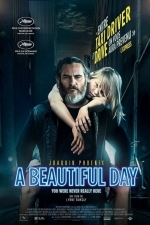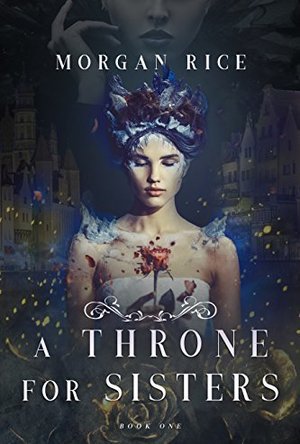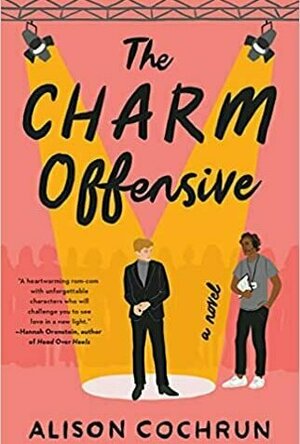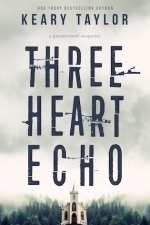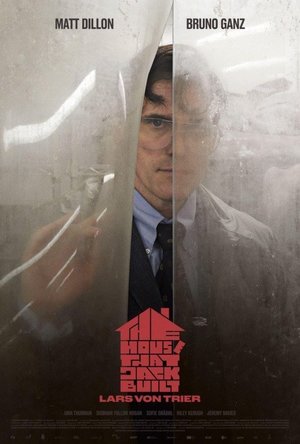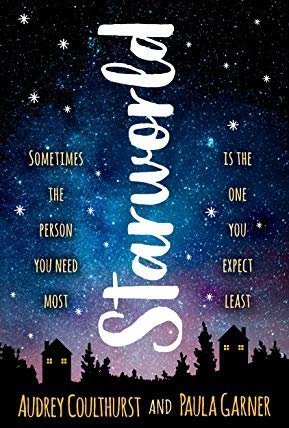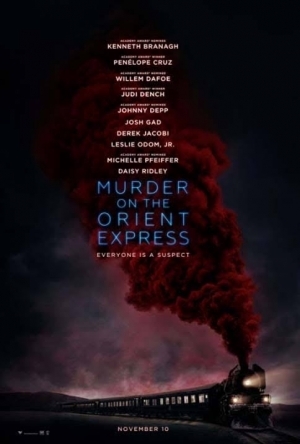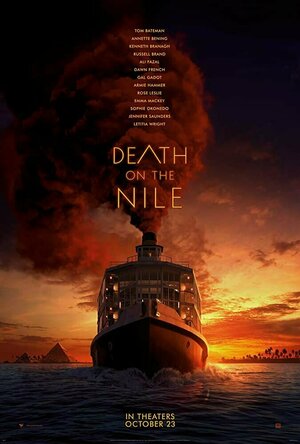Search
Bob Mann (459 KP) rated You Were Never Really Here (2018) in Movies
Sep 28, 2021
Joachim Phoenix delivers a standout performance in a violent tale of crusading.
Joachim Phoenix (“Her”) is a very intense actor, and fits perfectly here into the role of Joe. For he is a hired thug, available to do over anyone you think deserves dispatching or giving a good telling off. His weapon of choice for this task is a ball-point hammer, bought each time from a local hardware shop. He is a ghost, who drifts in and out of his jobs, face concealed by a hoodie and emanating an air of menace that automatically deflects enquiring eyes.
When hired by a Senator (Alex Manette) to rescue his wayward daughter Nina (Ekaterina Samsonov) from the clutches of a paedophile gang, Joe delivers on the job with gusto, and – you sense – a degree of satisfaction. But then things go from bad to violent worse and Joe is drawn into a deadly high stakes game. As things get more and more personal, Joe embarks on a personal crusade for justice and retribution.
The real joy of this film is that Joe is such a nuanced character. Yes, he’s a brutal thug, but is still living with and loving his aged and demented mother (Judith Roberts), even though she drives him to distraction. He’s also clearly damaged himself, with a high degree of OCD behavior exhibited. Via clever flashbacks, we get hints to the route that led the boy to become this damaged man. As a sociopath, when things go wrong he could just say “F*** it” and walk away. But he doesn’t. Is this altruism? A sense of professional pride? Or is it the sight of a path to redemption? Although you could strongly argue that revenge kicks in to reinforce his decision, Lynne Ramsay‘s screenplay leaves things deliciously vague. Ramsey also directs expertly: she previously did 2011’s “We Need To Talk About Kevin”.
“I don’t like gory films” you might say “so this doesn’t sound like one for me”. Me neither, but actually, the trailer makes the film seem worse than it is. The violence is more alluded to than shown. Most of the “hammer action” is done either in long shot or seen on CCTV cameras, and you don’t get to see much of the outcome. There is only one really gory bit that I remember (shut your eyes where Phoenix answers the knock at the hotel door if you are squeamish!).
This doesn’t mean that it’s a comfortable watch though. It’s an insanely tense film since you’re not sure the direction it will go in next (think “Get Out”), and it has more than its fair share of “WTF” moments, especially in a dramatic closing scene. There are some memorable cinematic moments as well: a young girl in a nightie in the paedophile den blankly observing Joe’s handiwork being one that stays with you.
It’s a standout film, winning Best Actor (for Phoenix) and best screenplay (for Ramsey) at Cannes. It will be in a strong position to make my films of the year list. Highly recommended.
When hired by a Senator (Alex Manette) to rescue his wayward daughter Nina (Ekaterina Samsonov) from the clutches of a paedophile gang, Joe delivers on the job with gusto, and – you sense – a degree of satisfaction. But then things go from bad to violent worse and Joe is drawn into a deadly high stakes game. As things get more and more personal, Joe embarks on a personal crusade for justice and retribution.
The real joy of this film is that Joe is such a nuanced character. Yes, he’s a brutal thug, but is still living with and loving his aged and demented mother (Judith Roberts), even though she drives him to distraction. He’s also clearly damaged himself, with a high degree of OCD behavior exhibited. Via clever flashbacks, we get hints to the route that led the boy to become this damaged man. As a sociopath, when things go wrong he could just say “F*** it” and walk away. But he doesn’t. Is this altruism? A sense of professional pride? Or is it the sight of a path to redemption? Although you could strongly argue that revenge kicks in to reinforce his decision, Lynne Ramsay‘s screenplay leaves things deliciously vague. Ramsey also directs expertly: she previously did 2011’s “We Need To Talk About Kevin”.
“I don’t like gory films” you might say “so this doesn’t sound like one for me”. Me neither, but actually, the trailer makes the film seem worse than it is. The violence is more alluded to than shown. Most of the “hammer action” is done either in long shot or seen on CCTV cameras, and you don’t get to see much of the outcome. There is only one really gory bit that I remember (shut your eyes where Phoenix answers the knock at the hotel door if you are squeamish!).
This doesn’t mean that it’s a comfortable watch though. It’s an insanely tense film since you’re not sure the direction it will go in next (think “Get Out”), and it has more than its fair share of “WTF” moments, especially in a dramatic closing scene. There are some memorable cinematic moments as well: a young girl in a nightie in the paedophile den blankly observing Joe’s handiwork being one that stays with you.
It’s a standout film, winning Best Actor (for Phoenix) and best screenplay (for Ramsey) at Cannes. It will be in a strong position to make my films of the year list. Highly recommended.
KittyMiku (138 KP) rated A Throne For Sisters in Books
May 23, 2019
This was a fairly good novel that teaches you that lying can bring you more harm than good, even if it buys you a little happiness. It also teaches you that no matter what, you can't escape those who wish to harm you. Even if the people who do so change. The story was the best to help create the intrigue in the story itself, but it did have a lot of errors that left something to be desired. I have to say the characters were pretty interesting, even if their backgrounds, personalities and such were lacking. An example being the sisters. They were given some distinct personality traits and an ability that made you want to know more about them, yet it hinted at their past making you really wish it would be delved into, so you can understand their situation and their different ways of thinking. I can only hope more will be revealed in the rest of the series, though with how the story is going, makes me wonder if it will ever be touched base again.
Though the novel is written in a way that allows the reader to see what each girl is doing on their own, you can't help but want a better way to see this happen. It really makes things confusing, going from one chapter to the next, knowing you will see what one girls doing this chapter and the other girl next chapter, but it can be hard when trying to make a timeline of the story. If the chapter headers would at least give you a time period so you knew exactly what was going on when, it would definitely had helped. I got the gist it was supposed to be each chapter was happening at the last chapter was, but it drove me insane when I found myself thinking that what this girl was doing might be happening after the girl I just finish reading about. I would have loved a better transition.
I also found, though the book had some good conversations, when they got voiced, that their weren't a lot of conversations going on in the book and the details of the scenery didn't make up for this. I am used to being able to see what the characters are thinking in the middle of conversations, but to not have a whole lot of them was very disappointing. It felt as if the conversations were skipped at times, just giving you a basis of what was discussed, when I would have loved to know more. I understand mundane conversations being skipped, but when the two characters are falling in love, it would be nice to have more conversations, details on the different characters actions, etc. However, none of that happened. Just brief sentences about it.
Though, I will probably read the rest of the series, just to figure out what happens next and because I am a little OCD about finishing series I start, I fear it won't stand up to my standards. With that said, I do think this book would be good for teens. It is fast paced, doesn't dwell on some of the finer details someone like I would enjoy, and had a great idea in the story plot. I would rate this book 2 stars out of 5 stars because of how it was written. I would have definitely loved more and hope in the future books, Rice will give us just that and not skimp out on things that may help the story become deeper and much more fulfilling.
Though the novel is written in a way that allows the reader to see what each girl is doing on their own, you can't help but want a better way to see this happen. It really makes things confusing, going from one chapter to the next, knowing you will see what one girls doing this chapter and the other girl next chapter, but it can be hard when trying to make a timeline of the story. If the chapter headers would at least give you a time period so you knew exactly what was going on when, it would definitely had helped. I got the gist it was supposed to be each chapter was happening at the last chapter was, but it drove me insane when I found myself thinking that what this girl was doing might be happening after the girl I just finish reading about. I would have loved a better transition.
I also found, though the book had some good conversations, when they got voiced, that their weren't a lot of conversations going on in the book and the details of the scenery didn't make up for this. I am used to being able to see what the characters are thinking in the middle of conversations, but to not have a whole lot of them was very disappointing. It felt as if the conversations were skipped at times, just giving you a basis of what was discussed, when I would have loved to know more. I understand mundane conversations being skipped, but when the two characters are falling in love, it would be nice to have more conversations, details on the different characters actions, etc. However, none of that happened. Just brief sentences about it.
Though, I will probably read the rest of the series, just to figure out what happens next and because I am a little OCD about finishing series I start, I fear it won't stand up to my standards. With that said, I do think this book would be good for teens. It is fast paced, doesn't dwell on some of the finer details someone like I would enjoy, and had a great idea in the story plot. I would rate this book 2 stars out of 5 stars because of how it was written. I would have definitely loved more and hope in the future books, Rice will give us just that and not skimp out on things that may help the story become deeper and much more fulfilling.
Kristy H (1252 KP) rated The Charm Offensive in Books
Sep 2, 2021
A delightful reality show romantic comedy
Dev Deshpande works on the set of Ever After, a reality dating show he's loved since he was a kid. He truly believes in the show's premise of happily ever after, even as his own six-year-relationship with Ryan, a co-worker, ends. Then the show casts Charles Winshaw, a handsome millionaire tech genius as their next prince. Charlie has only agreed to come on the show to fix his awkward image, which has made it impossible for him to get another job in tech. He's terrible in front of the cameras and even worse with the women he's supposed to woo. Dev is assigned as his handler, a last ditch attempt to save Ever After. As he works to get Charlie to open up, the two connect, and realize that their chemistry is far better than anything Charlie has with his potential love interests. But Ever After demands a fairy tale ending--what does that mean for Charlie and Dev?
"And maybe then Dev will forget that in his own life, happily ever afters are never guaranteed."
This is a truly lovely book, with a great romance filled with crackling tension combined with excellent points about mental illness and being loved unconditionally (or not, as the case may be). I fell head over heels in love with both Charlie and Dev--they are wonderful characters, whom you grow attached to easily.
Dev truly believes in the romance of the show when no one else does--including his ex, Ryan, and Charlie. Yet sweet Dev does not feel worthy of the love he so fervently believes in and can only offer up what he terms "Fun Dev," a light, easygoing version of his personality that does not reflect his true self. Meanwhile Charlie struggles with OCD and anxiety. He has never been in a serious relationship or given himself a true chance to explore whom he likes. The two feel so real and are so well-written: they just fly off the pages. I don't watch the Bachelor and other type shows, but if you do, I'm sure you'll love this book. Even if you don't though, there's so much to enjoy in the dynamics of the story and the examination of the pros and cons of reality shows--a look at how they treat women, racism, sexuality, and more.
"Then again, it turns out Charles Winshaw is no one's definition of a Prince Charming, no matter how much he might look the part."
Cochrun writes and describes anxiety so well and truly mental illness as a whole. It's treated seriously and given the respect it deserves. There is so much great representation in this book, include ace. And while it covers serious issues, at heart, this is a romance, and oh, it's so cute! There's so much steamy, sexual tension between Charlie and Dev. So many hot scenes, so much love and wondering and flirting... they are adorable together! This book made me smile and laugh and cry; it's so wonderful written and just bursting with goodness.
I do think Charlie probably could have gotten a new job in tech without going on a reality show, but oh well. Overall, this is such an excellent read. It's a wonderful blend of serious and fun and flirty and a great exploration into love and what happily ever after really means.
"And maybe then Dev will forget that in his own life, happily ever afters are never guaranteed."
This is a truly lovely book, with a great romance filled with crackling tension combined with excellent points about mental illness and being loved unconditionally (or not, as the case may be). I fell head over heels in love with both Charlie and Dev--they are wonderful characters, whom you grow attached to easily.
Dev truly believes in the romance of the show when no one else does--including his ex, Ryan, and Charlie. Yet sweet Dev does not feel worthy of the love he so fervently believes in and can only offer up what he terms "Fun Dev," a light, easygoing version of his personality that does not reflect his true self. Meanwhile Charlie struggles with OCD and anxiety. He has never been in a serious relationship or given himself a true chance to explore whom he likes. The two feel so real and are so well-written: they just fly off the pages. I don't watch the Bachelor and other type shows, but if you do, I'm sure you'll love this book. Even if you don't though, there's so much to enjoy in the dynamics of the story and the examination of the pros and cons of reality shows--a look at how they treat women, racism, sexuality, and more.
"Then again, it turns out Charles Winshaw is no one's definition of a Prince Charming, no matter how much he might look the part."
Cochrun writes and describes anxiety so well and truly mental illness as a whole. It's treated seriously and given the respect it deserves. There is so much great representation in this book, include ace. And while it covers serious issues, at heart, this is a romance, and oh, it's so cute! There's so much steamy, sexual tension between Charlie and Dev. So many hot scenes, so much love and wondering and flirting... they are adorable together! This book made me smile and laugh and cry; it's so wonderful written and just bursting with goodness.
I do think Charlie probably could have gotten a new job in tech without going on a reality show, but oh well. Overall, this is such an excellent read. It's a wonderful blend of serious and fun and flirty and a great exploration into love and what happily ever after really means.
Acanthea Grimscythe (300 KP) rated Three Heart Echo in Books
May 16, 2018
Three Heart Echo by Keary Taylor ended up on my reading list by yet another mislabeling on NetGalley, I must admit. As seen in the title image above, the book is a paranormal suspense. If you’ve read my blog for any length of time, you’ll no doubt guess that I grabbed it from the horror genre titles. Fortunately, after revisiting its cover I can at least say that its actual genre is the right one. While Three Heart Echo does have some elements of horror, it reads more like a paranormal-themed Lifetime movie.
Taking place soon after the death of Jack Caraway, Three Heart Echo tells the story of two vastly different people meeting and, you guessed it, falling in love. It’s not that simple though, and several of the more twisted things that one might expect from a horror novel surface throughout the plot. Iona Faye, a frail woman mourning the death of her fiance, seeks out Sully Whitmore, a man rumored to be able to speak to the dead. Together, the two unravel the darkness of Jack’s past while racing against time to unravel not one, but two curses.
The plot is fairly linear, with only one unexpected twist at the end. That twist defines much of the book though, and I have to admit that I actually felt anger flare up within me. I’ve gotta give Taylor kudos for that one. What I don’t like, besides the heavily romantic subplot, is the fact that, as readers see in many romance books, we’re dealing with two Mary Sue characters. Iona is described as a beautiful fawn whilst Sully is a giant Viking of a man. Catch my drift? Oh, and poor dead Jack? Apparently, he’s a stunner too.
While the plot is straightforward, Taylor also alternates between perspectives on chapters. Now, as a reader, you may think I mean she goes back and forth between past and present. It’s common enough when we read books, after all. Unfortunately, what I mean is that Taylor switches between perspectives of Sully and Iona. For the most part, the switches follow a pattern. There is some story overlap/repetition within those shifts, but it isn’t terrible. What perturbs me about these perspectives is that every now and then, there’s a break to the pattern where it may take some readers a moment to realize that the book has suddenly shifted to the past without warning.
Back to the romance side of things, there are far too many cliches. Poor, helpless main character gets an indescribable pain in their chest and they can’t fathom why it feels like their heart races when they look upon their love interest. As if that’s not bad enough, you know from the get-go that there’s going to be a love story involved. It’s not well enough to leave it a paranormal suspense, we might as well make it a romance too. Because y’know, two attractive people can’t simply be friends!
Speaking of chest pain, there’s another thing about this book that absolutely irked me. I could understand if one character had an odd need to count things. It happens and OCD is a real thing; but, what I’m referring to, is the need by both characters to take exactly five steps, to blink four times, to wait for three heartbeats before they do something so much as take a breath.
Finally, what the hell is a grand opus? The actual term is magnum opus. I’lll hope it was just a typo that was fixed in the final, published copy of the Three Heart Echo. Overall, the story itself is engaging to a degree, but it definitely wasn’t my style. I think it belongs more in the paranormal romance genre than it does horror.
I’d like to thank NetGalley and the author for providing me with a free copy for the purpose of review.
Taking place soon after the death of Jack Caraway, Three Heart Echo tells the story of two vastly different people meeting and, you guessed it, falling in love. It’s not that simple though, and several of the more twisted things that one might expect from a horror novel surface throughout the plot. Iona Faye, a frail woman mourning the death of her fiance, seeks out Sully Whitmore, a man rumored to be able to speak to the dead. Together, the two unravel the darkness of Jack’s past while racing against time to unravel not one, but two curses.
The plot is fairly linear, with only one unexpected twist at the end. That twist defines much of the book though, and I have to admit that I actually felt anger flare up within me. I’ve gotta give Taylor kudos for that one. What I don’t like, besides the heavily romantic subplot, is the fact that, as readers see in many romance books, we’re dealing with two Mary Sue characters. Iona is described as a beautiful fawn whilst Sully is a giant Viking of a man. Catch my drift? Oh, and poor dead Jack? Apparently, he’s a stunner too.
While the plot is straightforward, Taylor also alternates between perspectives on chapters. Now, as a reader, you may think I mean she goes back and forth between past and present. It’s common enough when we read books, after all. Unfortunately, what I mean is that Taylor switches between perspectives of Sully and Iona. For the most part, the switches follow a pattern. There is some story overlap/repetition within those shifts, but it isn’t terrible. What perturbs me about these perspectives is that every now and then, there’s a break to the pattern where it may take some readers a moment to realize that the book has suddenly shifted to the past without warning.
Back to the romance side of things, there are far too many cliches. Poor, helpless main character gets an indescribable pain in their chest and they can’t fathom why it feels like their heart races when they look upon their love interest. As if that’s not bad enough, you know from the get-go that there’s going to be a love story involved. It’s not well enough to leave it a paranormal suspense, we might as well make it a romance too. Because y’know, two attractive people can’t simply be friends!
Speaking of chest pain, there’s another thing about this book that absolutely irked me. I could understand if one character had an odd need to count things. It happens and OCD is a real thing; but, what I’m referring to, is the need by both characters to take exactly five steps, to blink four times, to wait for three heartbeats before they do something so much as take a breath.
Finally, what the hell is a grand opus? The actual term is magnum opus. I’lll hope it was just a typo that was fixed in the final, published copy of the Three Heart Echo. Overall, the story itself is engaging to a degree, but it definitely wasn’t my style. I think it belongs more in the paranormal romance genre than it does horror.
I’d like to thank NetGalley and the author for providing me with a free copy for the purpose of review.

iMoodJournal
Lifestyle and Health & Fitness
App
This beautiful app is an ultimate journal, personal diary and mood charting tool. It can track not...
Lucy Buglass (45 KP) rated The House That Jack Built (2018) in Movies
Jun 20, 2019
Danish director Lars Von Trier is no stranger to controversy. He has certainly divided film fans with some praising his work and some condemning it. The House That Jack Built is his most recent creation, causing audience members at Cannes to either walk out in disgust or stand up and applaud. This seriously mixed reception caught my interest and I wanted to find out what he’d done to generate such a response.
I’ve only seen two of his previous films; Antichrist and Melancholia, the former being a film that disturbed me so much I haven’t been able to watch it a second time. Its visceral, raw and harrowing portrayal of sex, violence, and self-mutilation is something that is a thoroughly uncomfortable and unpleasant watch. Because of Antichrist, I felt nervous yet strangely excited to see what The House That Jack Built had in store for me. I was surprised, however, to discover that it is arguably his tamest film to date, with a lot of the more graphic content happening off-screen. That doesn’t mean it doesn’t have its disturbing moments, but it was a lot less visceral than I was expecting based on its recent backlash.
The film is split into five chapters labelled ‘The Incidents’ and an epilogue, detailing some of the murders that Jack carried out over a 12-year span. Two of these incidents include child abuse and female mutilation, but is presented in a much more psychologically disturbing way rather than uncomfortable close-ups and drawn out scenes that you watch from behind your hands. The House That Jack Built spends more time tapping into Jack’s own psyche than it does the atrocities he commits, with Matt Dillon really stealing the show as the titular character.
It’s also darkly funny in places, which I certainly wasn’t expecting. Dillon’s portrayal of a psychotic killer with OCD is both terrifying and amusing. He is simultaneously charming and unhinged, which is a difficult thing to pull off. He was by far my favourite thing about the film, reminiscent of so many iconic serial killers that have fascinated the general public. The film relied heavily on Jack’s character and inner thoughts so it was great to see Dillon pull it off so brilliantly.
Much like Von Trier’s previous work, The House That Jack Built features lots of symbolism throughout the narrative. In this case, it focuses heavily on religion, art and family, with Jack being challenged on all of these as he recounts the incidents. The voice challenging him is a mystery to us until the third act, where Bruno Ganz’s character is finally revealed to us. I found this reveal to be a little jarring and strange, but not unexpected from one of his films. For me, the third act is where it started to go downhill and I lost interest, which is a real shame after the strength of the first two. Despite seeing some really great analyses online, it wasn’t enough to change my own views on the way it ended. It just seemed a little too out of place for my liking.
The visual style is interesting and combines live action with animation and still images. This feels very random but in the context of this particular film, it actually works in its favour. Both Dillon and Ganz narrate over the animation and still images, giving us monologues that act as food for thought and raise questions about morality, life, death and so on. It’s an intense film in that regard and one that you have to really concentrate on in order to enjoy properly.
The House That Jack Built is a depressing, harrowing and strange film. Its blend of sadistic violence and humour makes it a truly unique horror film that seems to appeal to a very specific audience. It’s not for the faint of heart, and Jack’s misogynistic killing sprees teamed with his nihilistic outlook on life is bound to be uncomfortable for many to witness. As a case study on a serial killer it’s a fascinating watch, but out of the three films I’ve seen, this one is unfortunately the weakest in my eyes.
https://jumpcutonline.co.uk/review-the-house-that-jack-built-2018/
I’ve only seen two of his previous films; Antichrist and Melancholia, the former being a film that disturbed me so much I haven’t been able to watch it a second time. Its visceral, raw and harrowing portrayal of sex, violence, and self-mutilation is something that is a thoroughly uncomfortable and unpleasant watch. Because of Antichrist, I felt nervous yet strangely excited to see what The House That Jack Built had in store for me. I was surprised, however, to discover that it is arguably his tamest film to date, with a lot of the more graphic content happening off-screen. That doesn’t mean it doesn’t have its disturbing moments, but it was a lot less visceral than I was expecting based on its recent backlash.
The film is split into five chapters labelled ‘The Incidents’ and an epilogue, detailing some of the murders that Jack carried out over a 12-year span. Two of these incidents include child abuse and female mutilation, but is presented in a much more psychologically disturbing way rather than uncomfortable close-ups and drawn out scenes that you watch from behind your hands. The House That Jack Built spends more time tapping into Jack’s own psyche than it does the atrocities he commits, with Matt Dillon really stealing the show as the titular character.
It’s also darkly funny in places, which I certainly wasn’t expecting. Dillon’s portrayal of a psychotic killer with OCD is both terrifying and amusing. He is simultaneously charming and unhinged, which is a difficult thing to pull off. He was by far my favourite thing about the film, reminiscent of so many iconic serial killers that have fascinated the general public. The film relied heavily on Jack’s character and inner thoughts so it was great to see Dillon pull it off so brilliantly.
Much like Von Trier’s previous work, The House That Jack Built features lots of symbolism throughout the narrative. In this case, it focuses heavily on religion, art and family, with Jack being challenged on all of these as he recounts the incidents. The voice challenging him is a mystery to us until the third act, where Bruno Ganz’s character is finally revealed to us. I found this reveal to be a little jarring and strange, but not unexpected from one of his films. For me, the third act is where it started to go downhill and I lost interest, which is a real shame after the strength of the first two. Despite seeing some really great analyses online, it wasn’t enough to change my own views on the way it ended. It just seemed a little too out of place for my liking.
The visual style is interesting and combines live action with animation and still images. This feels very random but in the context of this particular film, it actually works in its favour. Both Dillon and Ganz narrate over the animation and still images, giving us monologues that act as food for thought and raise questions about morality, life, death and so on. It’s an intense film in that regard and one that you have to really concentrate on in order to enjoy properly.
The House That Jack Built is a depressing, harrowing and strange film. Its blend of sadistic violence and humour makes it a truly unique horror film that seems to appeal to a very specific audience. It’s not for the faint of heart, and Jack’s misogynistic killing sprees teamed with his nihilistic outlook on life is bound to be uncomfortable for many to witness. As a case study on a serial killer it’s a fascinating watch, but out of the three films I’ve seen, this one is unfortunately the weakest in my eyes.
https://jumpcutonline.co.uk/review-the-house-that-jack-built-2018/
Despite running in very different circles in school, Sam Jones and Zoe Miller have more in common than they think: they both want to escape the difficulty that is their home lives. Sam is a quiet loner, content to spend Sundays with her best friend, Will. She loves the stars, but isn't sure she'll ever be able to study them, thanks to her mom, whose life is ruled by obsessive compulsive disorder. Ever since her Dad moved overseas, the burden of caring for her Mom falls squarely on Sam. Meanwhile, at school, Zoe seems carefree and popular. But her charisma hides her secrets: she struggles with the fact that she's adopted. She also has a mom in remission from cancer and a disabled younger brother who is the main focus of her parents. When the girls have a chance meeting at school, they exchange phone numbers, and suddenly find themselves bonding over text messages and a land they've created together: Starworld. Starworld gives Zoe and Sam the escape from reality they both so desperately need. But can it survive all the outside influences and stress each are facing?
"If I have a superpower, it's invisibility. Like the perpetually overcast skies of Portland in winter, I'm part of the background -- a robot with a disappearance drive, the dullness against which everyone else shines."
~Sam
This was an interesting and somewhat different YA novel. I enjoyed the story of two brave girls battling tough circumstances. Boy, poor Zoe and Sam certainly had the weight of the world on their shoulders. I really liked both of our main characters. The book tells the story from each of their perspectives, making it easy to know each girl. I found myself a bit more aligned to Sam--probably because she was queer and shy (like drawn to like, right?). As other reviews have mentioned, some of the book is in texting format, as Sam and Zoe fall into Starworld. Being far removed from teenagehood myself (sigh), I will admit that I did sometimes sort of "fast read" or skim those sections. I appreciated them--because Starworld meant so much to these girls and their friendship--but the text-speak wasn't always the easiest to read and digest.
I had picked this up thinking it was a love story, but it's not a true romance, though there's love in other forms. There's some great representation in this book: a queer character in Sam, plus discussion of adoption, mental illness (OCD and anxiety), disabilities, and more. All were very well treated too, I felt.
The book felt a little slow at times. It felt a little repetitive in its insistence on Zoe feeling different due to being adopted. Still, I was very drawn to Sam and Zoe's story. There was a strength in each of them, and I was intrigued to see what was going to happen. Sam's arc as she struggled with her romantic feelings was especially strong and wonderfully done.
Even though much of the book is serious, it's also very funny at times, with some excellent quotes and zingers. (I really did love Sam and her sense of humor; she was right up my alley.)
"I hate using phones for their original intended purpose. It's like Alexander Graham Bell wondered, Hey, what could maximize the awkwardeness of human-to-human communication? And then answered himself by giving us the ability to speak to one another through stupid disembodied little boxes."
I mean, right? One of the best quotes ever.
So, overall, this book is really a love story of friendship and triumph. It's very easy to root for the characters and get caught up in their lives. I was often just aghast at how much these poor girls had to go through. If you're not necessarily used to text-speak, it may give you a pause, but Starworld is a big part of the book (obviously!) and it's woven well into the story. This was a different and intriguing read, and I'm glad I picked it up. 3.5+ stars (rounded up to 4 here).
"If I have a superpower, it's invisibility. Like the perpetually overcast skies of Portland in winter, I'm part of the background -- a robot with a disappearance drive, the dullness against which everyone else shines."
~Sam
This was an interesting and somewhat different YA novel. I enjoyed the story of two brave girls battling tough circumstances. Boy, poor Zoe and Sam certainly had the weight of the world on their shoulders. I really liked both of our main characters. The book tells the story from each of their perspectives, making it easy to know each girl. I found myself a bit more aligned to Sam--probably because she was queer and shy (like drawn to like, right?). As other reviews have mentioned, some of the book is in texting format, as Sam and Zoe fall into Starworld. Being far removed from teenagehood myself (sigh), I will admit that I did sometimes sort of "fast read" or skim those sections. I appreciated them--because Starworld meant so much to these girls and their friendship--but the text-speak wasn't always the easiest to read and digest.
I had picked this up thinking it was a love story, but it's not a true romance, though there's love in other forms. There's some great representation in this book: a queer character in Sam, plus discussion of adoption, mental illness (OCD and anxiety), disabilities, and more. All were very well treated too, I felt.
The book felt a little slow at times. It felt a little repetitive in its insistence on Zoe feeling different due to being adopted. Still, I was very drawn to Sam and Zoe's story. There was a strength in each of them, and I was intrigued to see what was going to happen. Sam's arc as she struggled with her romantic feelings was especially strong and wonderfully done.
Even though much of the book is serious, it's also very funny at times, with some excellent quotes and zingers. (I really did love Sam and her sense of humor; she was right up my alley.)
"I hate using phones for their original intended purpose. It's like Alexander Graham Bell wondered, Hey, what could maximize the awkwardeness of human-to-human communication? And then answered himself by giving us the ability to speak to one another through stupid disembodied little boxes."
I mean, right? One of the best quotes ever.
So, overall, this book is really a love story of friendship and triumph. It's very easy to root for the characters and get caught up in their lives. I was often just aghast at how much these poor girls had to go through. If you're not necessarily used to text-speak, it may give you a pause, but Starworld is a big part of the book (obviously!) and it's woven well into the story. This was a different and intriguing read, and I'm glad I picked it up. 3.5+ stars (rounded up to 4 here).

BlockyTime - Track your time no need to Start/Stop
Productivity and Utilities
App
BlockyTime, A simple time logger no need to tap Start/Stop. ### App Store Featured of 2016 in China...
Bob Mann (459 KP) rated Murder on the Orient Express (2017) in Movies
Sep 29, 2021
You’ll never guess who dunnit…
There’s a big problem with Kenneth Branagh’s 2017 filming of the Hercule Poirot-based murder mystery…. and that’s the 1974 Sidney Lumet classic featuring Albert Finney in the starring role. For that film was so memorable – at least, the “who” of the “whodunnit” (no spoilers here) was so memorable – that any remake is likely to be tarnished by that knowledge. If you go into this film blissfully unaware of the plot, you are a lucky man/woman. For this is a classic Agatha Christie yarn.
The irascible, borderline OCD, but undeniably great Belgian detective, Poirot, is dragged around the world by grateful police forces to help solve unsolvable crimes. After solving a case in Jerusalem, Poirot is called back to the UK with his mode of transport being the famous Orient Express. Trapped in the mountains by an avalanche, a murder is committed and with multiple suspects and a plethora of clues it is up to Poirot to solve the case.
Branagh enjoys himself enormously as Poirot, sporting the most distractingly magnificent facial hair since Daniel Day-Lewis in “The Gangs of New York”. The moustache must have had its own trailer and make-up team!
Above all, the film is glorious to look at, featuring a rich and exotic colour palette that is reminiscent of the early colour films of the 40’s. Cinematography was by Haris Zambarloukos (“Mamma Mia” and who also collaborated with Branagh on “Thor) with lots of innovative “ceiling down” shots and artful point-of-view takes that might be annoying to some but which I consider as deserving of Oscar/BAFTA nominations.
The pictures are accompanied by a lush score by Patrick Doyle (who also scored Branagh’s “Thor”). Hats off also to the special effects crew, who made the alpine bridge scenes look decidedly more alpine than where they were actually filmed (on a specially made bridge in the Surrey Hills!).
All these technical elements combine to make the film’s early stages look and feel truly epic.
And the cast… what a cast! Dame Judi Dench (“Victoria and Abdul“); Olivia Coleman (“The Lobster“); Johnny Depp (“Black Mass“); Daisy Ridley (“Star Wars: The Force Awakens“); Penélope Cruz (“Zoolander 2“); Josh Gad (Olaf!); Derek Jacobi (“I, Claudius”); Willem Dafoe (“The Great Wall“) and Michelle Pfeiffer (“mother!“). A real case again of an “oh, it’s you” film again at the cinema – when’s the last time we saw that?
It’s also great to see young Lucy Boynton, so magnificent in last year’s excellent “Sing Street“, getting an A-list role as the twitchy and disturbed countess.
With all these ingredients in the pot, it should be great, right? Unfortunately, in my view, no, not quite. The film’s opening momentum is really not maintained by the screenplay by Michael Green (“Blade Runner 2049“; “Logan“). At heart, it’s a fairly static and “stagey” piece at best, set as it is on the rather claustrophobic train (just three carriages… on the Orient Express… really?). But the tale is made even more static by the train’s derailment in the snow. Branagh and Green try to sex up the action where they can, but there are lengthy passages of fairly repetitive dialogue. One encounter in particular between Branagh and Depp seems to last interminably: you wonder if the problem was that the director wasn’t always looking on to yell “Cut”!
All this leads to the “revelation” of the murderer as being a bit of an anticlimactic “thank heavens for that” rather than the gasping denouement it should have been. (Perhaps this would be different if you didn’t know the twist).
However, these reservations aside, it’s an enjoyable night out at the flicks, although a bit of a disappointment from the level of expectation I had for it. I can’t be too grumpy about it, given it’s a return to good old-fashioned yarn-spinning at the cinema, with great visuals and an epic cast. And that has to be good news.
For sure, Branagh does make for an amusing and engaging Poirot, even if his dialogue did need some ‘tuning in’ to. There was a suggestion at the end of the film that we might be seeing his return in “Death on the Nile” – the most lush and decorous of Peter Ustinov’s outings – which I would certainly welcome. He will have to find another 10 A-list stars though to decorate the boat, which will be a challenge for casting!
The irascible, borderline OCD, but undeniably great Belgian detective, Poirot, is dragged around the world by grateful police forces to help solve unsolvable crimes. After solving a case in Jerusalem, Poirot is called back to the UK with his mode of transport being the famous Orient Express. Trapped in the mountains by an avalanche, a murder is committed and with multiple suspects and a plethora of clues it is up to Poirot to solve the case.
Branagh enjoys himself enormously as Poirot, sporting the most distractingly magnificent facial hair since Daniel Day-Lewis in “The Gangs of New York”. The moustache must have had its own trailer and make-up team!
Above all, the film is glorious to look at, featuring a rich and exotic colour palette that is reminiscent of the early colour films of the 40’s. Cinematography was by Haris Zambarloukos (“Mamma Mia” and who also collaborated with Branagh on “Thor) with lots of innovative “ceiling down” shots and artful point-of-view takes that might be annoying to some but which I consider as deserving of Oscar/BAFTA nominations.
The pictures are accompanied by a lush score by Patrick Doyle (who also scored Branagh’s “Thor”). Hats off also to the special effects crew, who made the alpine bridge scenes look decidedly more alpine than where they were actually filmed (on a specially made bridge in the Surrey Hills!).
All these technical elements combine to make the film’s early stages look and feel truly epic.
And the cast… what a cast! Dame Judi Dench (“Victoria and Abdul“); Olivia Coleman (“The Lobster“); Johnny Depp (“Black Mass“); Daisy Ridley (“Star Wars: The Force Awakens“); Penélope Cruz (“Zoolander 2“); Josh Gad (Olaf!); Derek Jacobi (“I, Claudius”); Willem Dafoe (“The Great Wall“) and Michelle Pfeiffer (“mother!“). A real case again of an “oh, it’s you” film again at the cinema – when’s the last time we saw that?
It’s also great to see young Lucy Boynton, so magnificent in last year’s excellent “Sing Street“, getting an A-list role as the twitchy and disturbed countess.
With all these ingredients in the pot, it should be great, right? Unfortunately, in my view, no, not quite. The film’s opening momentum is really not maintained by the screenplay by Michael Green (“Blade Runner 2049“; “Logan“). At heart, it’s a fairly static and “stagey” piece at best, set as it is on the rather claustrophobic train (just three carriages… on the Orient Express… really?). But the tale is made even more static by the train’s derailment in the snow. Branagh and Green try to sex up the action where they can, but there are lengthy passages of fairly repetitive dialogue. One encounter in particular between Branagh and Depp seems to last interminably: you wonder if the problem was that the director wasn’t always looking on to yell “Cut”!
All this leads to the “revelation” of the murderer as being a bit of an anticlimactic “thank heavens for that” rather than the gasping denouement it should have been. (Perhaps this would be different if you didn’t know the twist).
However, these reservations aside, it’s an enjoyable night out at the flicks, although a bit of a disappointment from the level of expectation I had for it. I can’t be too grumpy about it, given it’s a return to good old-fashioned yarn-spinning at the cinema, with great visuals and an epic cast. And that has to be good news.
For sure, Branagh does make for an amusing and engaging Poirot, even if his dialogue did need some ‘tuning in’ to. There was a suggestion at the end of the film that we might be seeing his return in “Death on the Nile” – the most lush and decorous of Peter Ustinov’s outings – which I would certainly welcome. He will have to find another 10 A-list stars though to decorate the boat, which will be a challenge for casting!
Chris Sawin (602 KP) rated Death on the Nile (2022) in Movies
Feb 10, 2022
Most of the female cast. (2 more)
Poirot's backstory.
Kenneth Branagh's mustache.
Slow-moving with little payoff. (2 more)
Nothing substantial happens for the first hour.
Not entertaining. Perfect example of first world problems.
A Drowzy Whodunit Loaded with Mediocrity
Death on the Nile is the sequel to 2017’s Murder on the Orient Express with director and lead actor Kenneth Branagh returning. The mystery thriller is based on the 1937 novel of the same name by Agatha Christie. Death on the Nile has been adapted before as a 1978 film and as a 2004 episode of the Poirot television series starring David Suchet.
The 2022 film has been completed since December of 2019. The film was moved around several times due to COVID and was pushed back even further after Armie Hammer’s abuse allegations.
Mostly occurring shortly after the events of Murder on the Orient Express, Death on the Nile offers a bit of a look into the past of Hercule Poirot (Branagh). Taking place on the Yser Bridge in Belgium In 1914, a young Poirot advises his Belgian captain to attack the Germans spontaneously without warning. The attack is a success, but Poirot’s captain triggers an explosive after their victory. The explosion leaves Poirot’s face heavily scarred and offers an explanation as to why he always has a mustache.
Poirot reunites with his friend Bouc (Tom Bateman, who also returns from Murder on the Orient Express) in Egypt. Bouc is traveling with his mother Euphemia (Annette Bening) and their friends as they celebrate the marriage of Linnet Ridgeway (Gal Gadot) and Simon Doyle (Armie Hammer). To make matters more complicated, Simon was originally romantically involved with Jaqueline (Emma Mackey) who was also a former friend of Linnet. She now scornfully follows Simon and Linnet around Egypt.
The party travels on the S. S. Karnak, a steamship, along the river Nile. A murder eventually takes place on the steamship, which ignites a desire within Poirot to discover who the killer is before more suffer the same fate.
CGI and visual effects are used to make Kenneth Branagh look younger in the opening sequence of the film. The issue is he looks almost as bad as Henry Cavill did as Superman during the reshoots for Justice League. Branagh’s upper lip is almost nonexistent during this sequence and his philtrum seems to barely move when he speaks. It’s a visual nightmare and a terrible way to jump start a murder mystery.
Poirot travels to a Jazz nightclub where he’s first introduced to Simon, Jacqueline, and Linnet. Poirot spends much of the film embracing his OCD habits and people watching. This first nightclub sequence is about ten minutes long and you’re basically forced to watch people do nothing but dance for that entire time. Armie Hammer’s overly sexual dancing combined with his heavy breathing and constant sweating with both Gal Gadot and Emma Mackey is nauseating even without taking his sexual allegations into consideration.
Nothing really happens in the film for the first hour. Death on the Nile takes its time getting to the murder as little things begin to disappear (like a tube of paint) and Simon and Linnet are nearly crushed to death by a falling rock as they’re practically mid-coitus while sightseeing some pyramids. Emma Mackey gives a particularly strong performance. She is blinded by one-sided love in the film and her performance is a combination of passion, borderline insanity, and a broken heart.
Annette Bening is so cynical that it’s humorous and Jennifer Saunders adds just enough sarcastic bite to remind us ever so slightly of Absolutely Fabulous. Letitia Wright portrays business manager Rosalie Otterbourne. Her performance is intriguing because she’s always fighting for what she feels like she’s rightfully owed; whether it’s the right amount of money for her services or her happiness away from the limelight.
Like Murder on the Orient Express and other Agatha Christie adaptations, the enticing aspect of Death on the Nile is not only its massive and recognizable cast but also the fact that the story is written in a way that everyone is a suspect. The film’s nonchalant way of meandering towards that first murder is frustrating. A deliberate pace is one thing, but Death on the Nile is boring for the most part. Poirot is asked to take a case involving Jacqueline and the safety of Simon and Linnet, but is then mocked for being heartless and not being able to solve the case sooner. The people on board are likely meant to be scared, but come off as rich people not getting what they want the instant they want it.
Death on the Nile crawls towards a resolution you don’t feel invested in. Poirot’s backstory is interesting and there are some solid performances especially from the female cast, but the film otherwise feels like an unwanted game of Guess Who after you unwillingly chug two bottles of NyQuil and are asked to predict who the killer is after two long hours of tediousness.
The 2022 film has been completed since December of 2019. The film was moved around several times due to COVID and was pushed back even further after Armie Hammer’s abuse allegations.
Mostly occurring shortly after the events of Murder on the Orient Express, Death on the Nile offers a bit of a look into the past of Hercule Poirot (Branagh). Taking place on the Yser Bridge in Belgium In 1914, a young Poirot advises his Belgian captain to attack the Germans spontaneously without warning. The attack is a success, but Poirot’s captain triggers an explosive after their victory. The explosion leaves Poirot’s face heavily scarred and offers an explanation as to why he always has a mustache.
Poirot reunites with his friend Bouc (Tom Bateman, who also returns from Murder on the Orient Express) in Egypt. Bouc is traveling with his mother Euphemia (Annette Bening) and their friends as they celebrate the marriage of Linnet Ridgeway (Gal Gadot) and Simon Doyle (Armie Hammer). To make matters more complicated, Simon was originally romantically involved with Jaqueline (Emma Mackey) who was also a former friend of Linnet. She now scornfully follows Simon and Linnet around Egypt.
The party travels on the S. S. Karnak, a steamship, along the river Nile. A murder eventually takes place on the steamship, which ignites a desire within Poirot to discover who the killer is before more suffer the same fate.
CGI and visual effects are used to make Kenneth Branagh look younger in the opening sequence of the film. The issue is he looks almost as bad as Henry Cavill did as Superman during the reshoots for Justice League. Branagh’s upper lip is almost nonexistent during this sequence and his philtrum seems to barely move when he speaks. It’s a visual nightmare and a terrible way to jump start a murder mystery.
Poirot travels to a Jazz nightclub where he’s first introduced to Simon, Jacqueline, and Linnet. Poirot spends much of the film embracing his OCD habits and people watching. This first nightclub sequence is about ten minutes long and you’re basically forced to watch people do nothing but dance for that entire time. Armie Hammer’s overly sexual dancing combined with his heavy breathing and constant sweating with both Gal Gadot and Emma Mackey is nauseating even without taking his sexual allegations into consideration.
Nothing really happens in the film for the first hour. Death on the Nile takes its time getting to the murder as little things begin to disappear (like a tube of paint) and Simon and Linnet are nearly crushed to death by a falling rock as they’re practically mid-coitus while sightseeing some pyramids. Emma Mackey gives a particularly strong performance. She is blinded by one-sided love in the film and her performance is a combination of passion, borderline insanity, and a broken heart.
Annette Bening is so cynical that it’s humorous and Jennifer Saunders adds just enough sarcastic bite to remind us ever so slightly of Absolutely Fabulous. Letitia Wright portrays business manager Rosalie Otterbourne. Her performance is intriguing because she’s always fighting for what she feels like she’s rightfully owed; whether it’s the right amount of money for her services or her happiness away from the limelight.
Like Murder on the Orient Express and other Agatha Christie adaptations, the enticing aspect of Death on the Nile is not only its massive and recognizable cast but also the fact that the story is written in a way that everyone is a suspect. The film’s nonchalant way of meandering towards that first murder is frustrating. A deliberate pace is one thing, but Death on the Nile is boring for the most part. Poirot is asked to take a case involving Jacqueline and the safety of Simon and Linnet, but is then mocked for being heartless and not being able to solve the case sooner. The people on board are likely meant to be scared, but come off as rich people not getting what they want the instant they want it.
Death on the Nile crawls towards a resolution you don’t feel invested in. Poirot’s backstory is interesting and there are some solid performances especially from the female cast, but the film otherwise feels like an unwanted game of Guess Who after you unwillingly chug two bottles of NyQuil and are asked to predict who the killer is after two long hours of tediousness.
